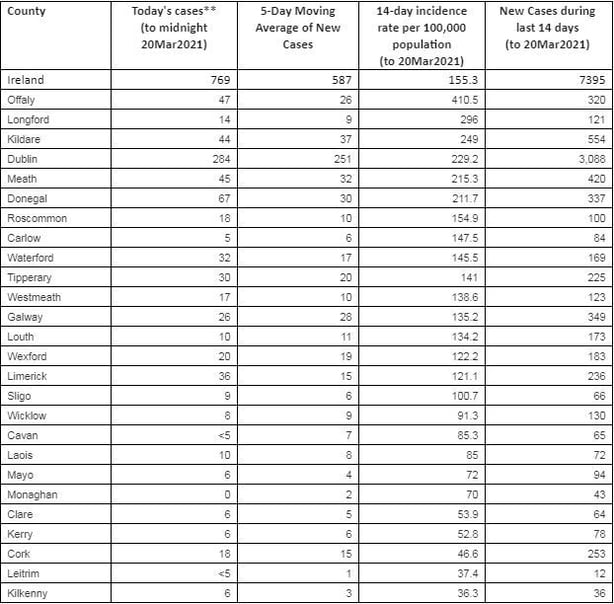There have been 769 cases of Covid-19 reported by the Department of Health, along with two Covid-related deaths
It is the highest daily increase in cases reported since Friday 26 February.
Of today's cases, 75% are in people under the age of 45, with a median age of 32.
Geographically, 284 of the cases are in Dublin, with 67 in Donegal, 47 in Offaly, 45 in Meath and 44 in Kildare. The remaining 282 cases are spread across 20 other counties.
The number of people with Covid-19 being treated in hospital has increased from 328 yesterday to 360. This figure includes 82 patients who are receiving intensive care.
654,251 doses of Covid-19 vaccine have been administered in Ireland as of Thursday 18 March. 478,725 people have received their first dose and 175,526 of these have also received a second dose.
The number of people who will have received their first dose of a vaccine is expected to reach half a million in the next few days.
The national 14-day incidence of the virus stands at 155.3 cases per 100,000 people.

Counties with the highest incidence include Offaly, Longford, Kildare and Dublin, while counties with the lowest incidence include Kilkenny, Leitrim, Cor and Kerry.
It comes after the Health Service Executive's Chief Clinical Officer expressed concern over a "stubbornly high" level of Covid-19.
Speaking on RTÉ’s This Week, Dr Colm Henry said the trend they are seeing is a "definite stagnation" and the 14-day incidence rate has also stagnated.
He said the reproduction number of the virus is stuck on 1, which means the disease is stable or increasing.
"So there are some signals of concern that sometimes anticipate deteriorations of some of these numbers and one is an increase in referrals for GPs for testing, another is that close contacts of established cases are a very high percentage positivity of 24% and one in three household contacts are positive."
He warned that the virus is at a much higher level than it was in early December and as long as it remains like this it will convert into a stream of hospital admissions.
Dr Henry said there is no evidence schools have played into the current high numbers of Covid-19.
He said there has been a small number of outbreaks in schools and overall positivity within contacts is much lower that it is in the community.
He also reinforced the message that community transmission represents a major risk.
Read more: Latest coronavirus stories
Acknowledging that people are suffering and exhausted, Dr Henry said it becomes more difficult with every surge to make same sacrifices.
While he said consideration for any easing of restrictions lies with Government, he said there is public health recognition of the huge impact Covid-19 is having on well-being and the suffering people have had including isolation.
"We would all like to see numbers lower as the lower we get the more choices we will have."
Dr Henry said as summer approaches he would like some focus on health and well-being and what people can do outdoors.
We need your consent to load this rte-player contentWe use rte-player to manage extra content that can set cookies on your device and collect data about your activity. Please review their details and accept them to load the content.Manage Preferences
He also hopes for more easing on the advice for older people as they get fully vaccinated.
Dr Henry said Covid-related hospitalisations are not exclusive to older people or those with underlying health conditions as the virus rates remain high.
"We will see ongoing admissions to hospital of all age groups."
Regarding contact tracing he said for around 70 to 80% of Covid cases, the source is known.
He said in about 20 to 30% of cases people don't know and public health departments carry out some degree of source investigation, such as checking up on people coming from Category 2 countries or school or health settings.
"It is our intention as numbers fall that we carry out source investigation".
He accepted that there may need to be thousands of contact tracers to break the spread of the virus.
However, Dr Henry said source investigation becomes much more effective as a tool once there is suppression of the community transmission as it prevents resurgence of the disease.
Separately, he is confident the HSE will be able to catch up on vaccinating those who were due to have the AstraZeneca vaccine last week over the next ten days.
Dr Henry said he can see how people might see the pause as a setback but said people should be assured it is a safe and effective vaccine.
"20 million have received the vaccine. What I'm hoping is people will accept we had to pause to assess a signal," he said.
He said like with any medication an information leaflet will list the possible side effects from the vaccine.
He said the HSE is not in a position to give an alternative vaccine to those who seek another one.
"We are confident based on not just trials but real world experience that it is safe."
There is concern that case numbers may start to rise again.
Online platform, GPBuddy which has been collecting data on General Practitioner referrals, says it has seen an increase in the number of patients being referred for tests in the past week.
Meanwhile, vaccination is continuing in the Helix in Dublin today for some people over 75 years and in a number of hospitals for some of those with serious underlying conditions.
It is expected that within the next few days, the number of people who will have received their first dose of the vaccine, will reach half a million.
Additional reporting Orla O'Donnell
